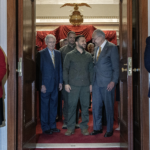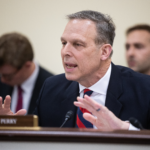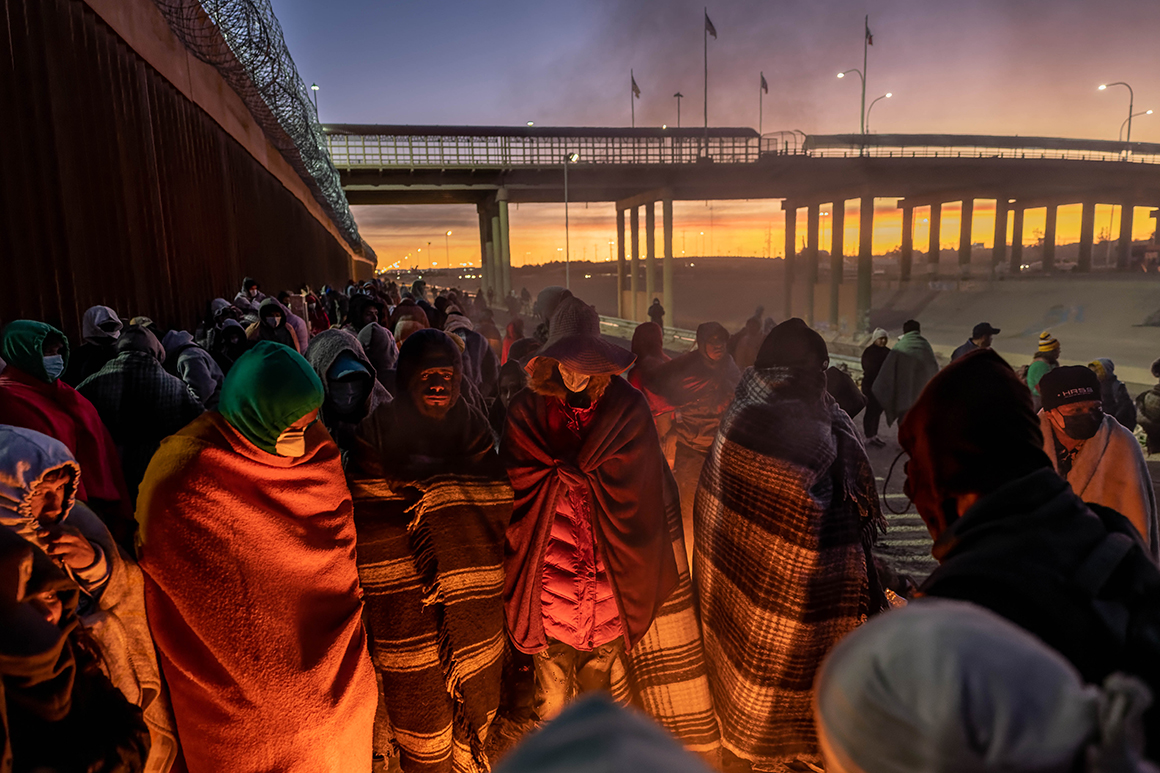The announcement was made as the Departments of Homeland Security and Justice released details of a plan to impose a new regulation — a version of a Trump-era policy often called the “transit ban.” Under the new rule, migrants would be prohibited from applying for asylum in the United States unless they were first turned away for safe harbor by another country. It would also deem ineligible migrants who don’t go through authorized ports of entry. DHS and DOJ will hear public comment on the proposed regulation before it goes into effect.
Biden said the new details announced Thursday “won’t fix our entire immigration system but they can help us a good deal in better managing what is a difficult challenge.” He added: “Until Congress passes the funds, a comprehensive immigration plan to fix the system completely, my administration is going to work to make things at the border better using the tools that we have.”
The president also confirmed plans for his first visit to the U.S.-Mexico border since taking office. Biden said he will visit El Paso, Texas, on Sunday to “assess border enforcement operations” and “meet with local officials.” The visit comes ahead of his trip to Mexico City for the “Three Amigos” summit with his Canadian and Mexican counterparts.
The moves reflect the Biden administration’s latest venture to combat a migration surge straining the U.S. immigration system. They also come as the president faces growing criticism from both Republicans and Democrats on border issues.
The topic has intensified for the Biden administration in recent weeks as officials prepared for a court-ordered end to Title 42 limits, only to see the Supreme Court temporarily block lifting the policy. But regardless of the Trump-era policy’s fate — set to be decided by the high court later this year — the southern border is facing a record-breaking migration influx likely to remain a key policy issue throughout Biden’s presidency.
Biden referenced a plan he put forth in the early days of his presidency to overhaul the “broken immigration system,” including policy to crack down on illegal immigration and protect recipients of the Deferred Action for Childhood Arrivals and other “Dreamers” brought to the U.S. illegally as children by their family. The president called out Republicans for rejecting his proposal and his requests for additional funding.
“Our problems at the border didn’t arise overnight and are not going to be solved overnight. It’s a difficult problem. It’s clear that immigration is a political issue that extreme Republicans are always going to run on,” he said. “But now they have a choice. They can keep using immigration to try to score political points or they can help solve the problem and come together to fix the broken system.”
The humanitarian parole program, effective immediately, builds upon the one rolled out solely for Venezuelans this fall, which created a narrow pathway for up to 24,000 migrants who have preexisting ties in the U.S., and people who could provide financial and other support. Implementation of the program, which deals with countries facing political and economic turmoil, is dependent on the use of the Title 42 authority to turn away those at the U.S.-Mexico border who don’t qualify.
Border agents have already turned away masses of Venezuelans using Title 42 authority over the past few months, and now they will do the same for Cubans, Haitians and Nicaraguans. Mexico has agreed to accept 30,000 migrants per month from the four countries, Biden said.
Migrants who cross unlawfully into Panama or Mexico will be also deemed ineligible for the program, in an attempt to discourage people from taking the dangerous journey through the Darien Gap.
The program for Venezuelans, announced in October 2022, forces migrants to apply for asylum from their home country, while expelling those who tried to enter the U.S. unlawfully from Mexico. Venezuelans who were approved for humanitarian parole were allowed to enter the U.S. by air. The number of those migrants crossing illegally has dropped 70 percent, falling from about 21,000 in October to 6,200 in November, according to latest U.S. Customs and Border protection data.
Alongside additional legal pathways and deterrence, the administration is continuing its preparation for the end of Title 42 limits, Biden said Thursday. The administration is working to counter cartels and human smuggling networks, while surging resources like personnel, transportation, medical support and facilities to support border officials. Border cities and other jurisdictions receiving a large number of migrants will also receive additional funding and support, Biden said Thursday. DHS plans to expand outreach to state and local officials.
These steps come as Democratic-led cities dealing with migrants bused in from the southern border pleaded with the White House this week to help them manage an influx that has already overloaded community resources. Republicans have also called on the administration to do more, with Sen. Marco Rubio (R-Fla.) and Republican Gov. Ron DeSantis pointing out the high levels of Cuban and Haitian migrants in South Florida.
New York Mayor Eric Adams said Biden has been listening to appeals by him and fellow Democratic mayors of Chicago and Washington, D.C. “and he realizes that there are things we must do.”
“And I just don’t believe this is the end of the sentence. This is a comma. We need to continue that sentence so it ends with an exclamation point, and we have resolved our decade of border crisis,” he said.
But Texas Gov. Greg Abbott, a Republican, called Biden’s plan a “band-aid for a historic flood.”
While Thursday’s announcements could temporarily help the administration tackle the record number of people fleeing to the U.S., the president’s speech was met with swift condemnation from immigration reform advocates and lawyers who decry any expansion of Title 42, which has allowed border agents to immediately expel millions of migrants on public health grounds without considering their claims for asylum. For days, administration officials have been weighing the political consequences of doubling down on public health policy.
Sen. Bob Menendez (D-N.J.) slammed the moves on Thursday. He said while he approved of the administration’s decision to increase access to parole for a small number of migrants, “this benefit will exclude migrants fleeing violence and persecution who do not have the ability or economic means to qualify for the new parole process.”
“The Biden Administration’s decision to expand Title 42, a disastrous and inhumane relic of the Trump Administration’s racist immigration agenda, is an affront to restoring rule of law at the border,” Menendez said in a statement. “I am deeply disturbed that instead of working with Congress to develop a solution to the multiple humanitarian crises that are fueling mass migration in our hemisphere, the Administration is circumventing immigration law which will exacerbate chaos and confusion at the Southern border.”
Coupling this action with the resurrection of a policy similar to the Trump-era transit ban put the administration in defensive mode to ward off criticism among Democrats and immigrant advocates. Menendez said the decision to move forward with an “unlawful” transit ban “erases the words and values etched on the Statue of Liberty.”
Homeland Security Secretary Alejandro Mayorkas, at a press conference that immediately followed Biden’s, repeatedly said the new policy has “no resemblance” to the previous administration’s transit ban because DHS has also introduced lawful pathways.
He also further detailed plans to expand Title 8 border processing in anticipation for the end of Title 42 restrictions. Title 8 would allow the government to quickly remove from the country anyone unable to establish a legal basis — such as an approved asylum claim. These migrants would be subject to a five-year reentry ban.
“I think rather than see this as restricting individuals’ abilities to seek asylum, you should see this as managing the border in an orderly and humane way, while also expanding these pathways with the parole program,” one administration official said Thursday when asked about potential blowback to the announcements.
Marianne LeVine, Erin Durkin and Gary Fineout contributed to this report.
Author Profile
- "Lean Left" Bias Rating
- Politico, known originally as The Politico, is an American, German-owned political journalism newspaper company based in Arlington County, Virginia, that covers politics and policy in the United States and internationally. It primarily distributes content online but also with printed newspapers, radio, and podcasts.
Latest entries
 HeadlinesOctober 19, 2023Obama’s Aid Chief Has Some Surprising Ideas for How to Win Over Republicans
HeadlinesOctober 19, 2023Obama’s Aid Chief Has Some Surprising Ideas for How to Win Over Republicans HeadlinesOctober 18, 2023‘Great damage has been done’: Arab American leaders privately confront Biden administration
HeadlinesOctober 18, 2023‘Great damage has been done’: Arab American leaders privately confront Biden administration HeadlinesJune 13, 2023'Trying to figure it out': McCarthy's conservative rebels struggle with next steps
HeadlinesJune 13, 2023'Trying to figure it out': McCarthy's conservative rebels struggle with next steps HeadlinesJune 11, 2023Autism Advocates Are Dreading a Campaign Season of Insinuations About Ron DeSantis
HeadlinesJune 11, 2023Autism Advocates Are Dreading a Campaign Season of Insinuations About Ron DeSantis

